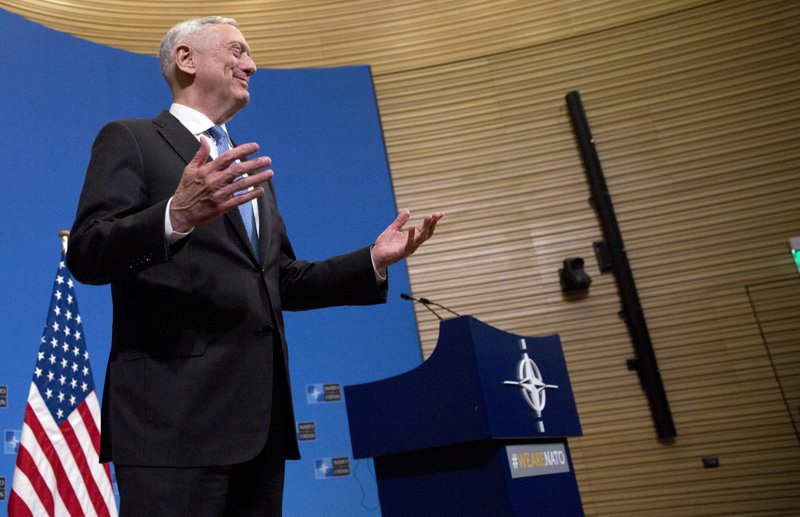BRUSSELS -- The U.S. will intensify combat against the Islamic State affiliate in Afghanistan during the Kabul government's temporary halt to attacks on the Taliban, senior U.S. officials said Friday.
Defense Secretary James Mattis said this could, for example, allow the U.S. to partially shift the focus of aerial surveillance from the Taliban to Islamic State fighters as well as al-Qaida extremists, who remain a threat 17 years after the U.S. invaded.
Mattis spoke to reporters during a break in a NATO defense ministers meeting, which included a discussion of progress and problems in Afghanistan. The ministers also discussed more broadly the international campaign against the Islamic State. The campaign has focused since 2014 on eliminating the group's so-called caliphate in Iraq and Syria.
In remarks to ministers at the start of the meeting, Mattis argued for continuing military pressure on the Islamic State even after the fighting in Syria is over. He did not mention that President Donald Trump has said he wants the U.S. to exit Syria as soon as it can, perhaps within a matter of months.
"As operations ultimately draw to a close, we want to avoid leaving a vacuum in Syria that can be exploited" by the Islamic State and other extremists, he said. "Our fight is not over," he added. "We must deal ISIS an enduring, not just a territorial, defeat."
He used an alternate acronym for the Islamic State.
Later he said leaving Syria before a U.N.-led peace process was underway "would be a strategic blunder."
Army Gen. John Nicholson, the top U.S. general in Afghanistan, said the fight against the Islamic State in the eastern Nangarhar province had already been intensifying this year and would be further stepped up during the Afghan cease-fire against the Taliban, which does not apply to other opposition groups. Nicholson spoke with reporters on the sidelines of the NATO meeting.
Speaking separately at a NATO news conference, Mattis said the cease-fire could put U.S. forces in a better position to fight other extremist groups such as the Islamic State affiliate and remnants of al-Qaida.
"If the Taliban take full advantage of the cease-fire in the best interests of the Afghan people, then many of the surveillance assets that we have overhead can be reoriented to ISIS-K, to al-Qaida and other foreign terrorists that have no business being in Afghanistan in the first place," Mattis said. ISIS-K is a name for the Islamic State affiliate that operates in three provinces in eastern Afghanistan.
Nicholson said he could not predict whether the Taliban will join the cease-fire announced this week by President Ashraf Ghani. He expressed no concern that a unilateral cease-fire would give the Taliban breathing room to regroup and rearm.
"The potential benefit is greater than the risk," he said, expressing hope that what Ghani called a weeklong pause could lead to something more substantial and improve prospects for actual peace negotiations. The Taliban have insisted that they would negotiate only with Washington, but the U.S. insists that the Taliban talk to the Afghan government.
U.S. forces will remain prepared to respond to any Taliban attacks, Nicholson said. The U.S. has about 8,400 troops providing noncombat support for Afghan security forces fighting the Taliban; separately, roughly 7,000 U.S. combat troops are fighting al-Qaida and Islamic State-affiliated groups.
Nicholson, who has commanded the U.S.-led military coalition in Afghanistan since March 2016, spoke with measured optimism about prospects for compelling the Taliban to enter peace negotiations with the Afghan government.
U.S. officials have talked up the prospects for peace many times over the course of the war, only to be disappointed.
Nicholson, however, credited Trump's policy with producing early signs that the Taliban might be considering peace talks, although the militant group has not publicly acknowledged it is considering negotiations with the Afghan government.
Information for this article was contributed by Lorne Cook of The Associated Press.
A Section on 06/09/2018
